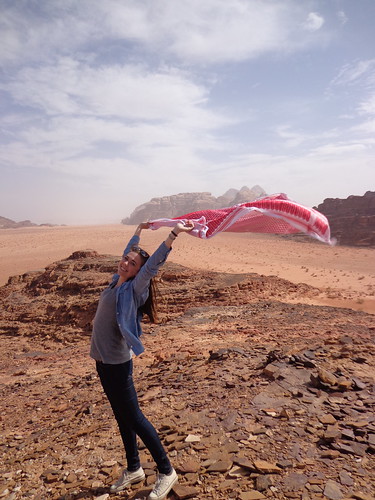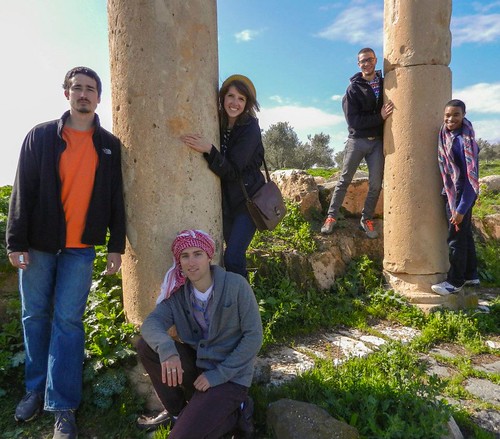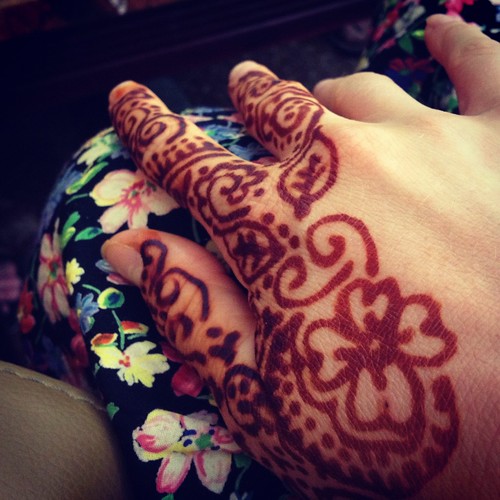The information in this handbook is intended to help you make preparations for your study abroad experience. Read it thoroughly and refer back to it often. You may wish to download the PDF version either to print or save to devices you will have with you while abroad.
While comprehensive, the handbook is not exhaustive. You should seek as much information as possible from a variety of resources to prepare for your adventure: program- or country-specific orientation materials, U.S. Department of State country specific information, Center for Disease Control and Prevention resources, travel guidebooks, historical and fictional works about your host country, etc.
In addition to reading materials, you should talk to people who are knowledgeable about your program or host country: your study abroad adviser, former program participants, host country natives, MU faculty or staff, and friends and family. These people will be great sources of information and advice. In the end, though, it won't be possible to prepare yourself completely. There will be situations you haven't anticipated, and your flexibility will go a long way toward making your time abroad a positive one.
Have a safe journey and we look forward to hearing about your adventure abroad.
Handbook, section 1 of 5: Before you go
CHECKLIST
- Apply for a passport or check to see that your current passport will be valid for six months beyond your program end date. Passport processing may take up to six weeks, and you can apply on campus at the International Center.
- Turn in your supplementary application materials to your MU study abroad adviser.
- If you are a senior, obtain a final 30-hour residency requirement waiver (if applicable).
- Meet with a financial aid adviser to make arrangements to use any grants, loans or scholarships toward study abroad.
- Complete your Course Proposal for Study Abroad. Submit the completed form to your study abroad adviser, and be sure to keep a copy for your records.
- Make your flight arrangements.
- Make copies of your passport — carry one with you separately from the original, leave one with a friend or family member and email one to yourself.
- Be sure that your credit or debit cards don't expire while you're abroad.
- Make arrangements to take care of your bills while abroad, as well as your income taxes and FAFSA (if applicable).
- Change your mailing address to your permanent address in myZou in order to receive all important mail from MU while you are gone.
- Obtain cash in the currency of your host country (if applicable).
TRAVEL DOCUMENTS
APPLY FOR A PASSPORT
If you haven't already applied for a passport, you should do so immediately. Passport applications can take up to eight weeks to process. Make sure that your passport is valid for at least six months beyond the end date of your program. You can apply for your passport at the International Center — go to the center's website for more information or call 573-882-6007 to make an appointment.
VISA INFORMATION
A visa is your official permission to enter a specific country and is granted by that country's government. Determine if a visa is required for your study abroad program — ask your adviser or go to travel.state.gov. For specific information, go to the consular or embassy website for your host country. Applying for a visa can take several weeks, so start the process early. If you plan to travel outside of your host country while you are abroad, be sure to check the entry regulations for any country you plan to visit. Some countries will require that you obtain a visa just to enter the country, regardless of the purpose or length of your visit.
HEALTH INSURANCE
All MU students studying abroad are required to be enrolled in comprehensive international health insurance. You should print off your insurance cards from GeoBlue and UnitedHealthcare Global before you leave. Carry copies of these cards with you at all times. MU students may only use the MU enrollment code for official MU study abroad programs. You can purchase GeoBlue insurance directly for other international travel. You should never cancel your domestic health insurance while you are abroad, as it may be difficult to resume coverage when you return.
GEOBLUE
This policy provides comprehensive sickness and accident insurance and emergency travel medical insurance, including coverage for medical evacuation and repatriation of remains, which is generally not provided by domestic insurance companies. GeoBlue has also identified a network of doctors worldwide who will provide treatment and file claims on your behalf without requiring payment at the time of treatment. Prior to departure for study abroad, GeoBlue assists students in establishing treatment for ongoing medical conditions while abroad (including doctor visits and continuing medications). For more information about the features and benefits of this policy, please see the brochure in your myStudyAbroad account.
Students participating on most MU programs will be automatically enrolled by the International Center in the GeoBlue plan, and all charges will be billed to your MU student account. After you have been enrolled and have received your insurance card, you should go to the GeoBlue website. Using the certificate number on the front of your card, sign in to the site to obtain detailed information related to the plan, including a doctor locator, city health profiles and translations of medical terms and phrases. Your family can access the same information by logging in to the GeoBlue parent/guardian portal using your insurance ID number and your email address.
UNITEDHEALTHCARE GLOBAL
UnitedHealthcare Global insurance includes political and security evacuation services, transportation after evacuation and real-time security intelligence. More information about the UnitedHealthcare Global policy and a copy of your student ID card can be found in your myStudyAbroad account.
PRE-DEPARTURE HEALTH CARE
You should have physical, dental and eye exams to ensure you are healthy before you leave. You should also assemble your complete medical record, including information regarding current medications, any chronic health conditions, allergies, immunization history, blood type, name and contact information of your primary health care provider and copy of your health insurance policy. Store your records in a secure place, make a copy to carry with you and email a copy to yourself as back-up.
DISCLOSING ON-GOING HEALTH ISSUES
Having a pre-existing physical or mental health issue will not jeopardize your acceptance to a study abroad program. Each year, many MU students who have on-going physical or mental health issues successfully study abroad. If you have an on-going health issue, you will work with U.S.-based health care providers to make arrangements for taking medications and continuing treatment abroad. Developing a plan to manage your health before you depart can allow you to seamlessly transfer the care you are receiving in the U.S. to your study abroad destination.
You are asked to disclose any on-going health conditions on the confidential health information form in your myStudyAbroad account. Each form is reviewed by the international Center's consultant in the MU Student Health Center, and the consultant will provide guidance about how best to manage your health condition abroad. This information will be kept confidential except in case of an emergency. For this reason, you are encouraged to make your program leader or primary on-site contact person aware of your health condition so they will know how to best assist you if needed.
All MU study abroad participants are required to have comprehensive health insurance coverage while abroad. You should work with your U.S. health care providers and insurance carriers to locate English-speaking providers in the country(s) where you will be studying.
IMMUNIZATIONS
You should make sure all your routine immunizations are up to date. Locate your childhood and adult immunization records and take them with you to your pre-travel physical exam. You can make a travel appointment at the MU Student Health Center to have your immunization record reviewed and receive any immunizations you may need. During this appointment, the health care practitioner will discuss other vaccinations, medications or precautions specific to your destination, including issues like traveler's diarrhea, malaria, food and water precautions, and insect precautions, as well as your personal medical history. Some immunizations require multiple injections over a period of time, so don't wait to schedule an appointment. To schedule a travel appointment at the Student Health Center, review the information on its website
PRESCRIPTION MEDICATIONS
If you will be taking prescription medications while abroad, you should consult with your physician prior to departure regarding any need for monitoring while abroad. You are responsible for confirming that any prescription medications you take are legal and available in your host country before you depart. You should check with the embassy of your host country to determine what is legal and what additional documentation you may need (e.g., original prescription, physician's letter). Some U.S. prescriptions cannot be brought into other countries, even when accompanied by extensive official paperwork, in particular medications that contain substances such as amphetamines that are often abused. In some countries, common over-the-counter medication in the U.S., including inhalers and allergy and sinus medicines, are illegal. It is critical that you discuss any such limitations in your host country with your health care providers before departure and to have a plan for obtaining adequate quantities of any medications that are legal in your host country.
You should plan to bring enough of any prescription medications that are legal in your host country to last for the duration of your program, if possible. It is generally not legal to mail medications overseas, so it is important to bring a sufficient supply for your stay. All medications should be in their original containers and clearly labeled; do not put them in pill boxes or organizers. This way, customs officials will be able to easily determine that your medications are not illegal substances. You should also bring a letter from your physician that lists the generic name of your medication so a local physician will be able to more quickly identify the local equivalent medication if you need to obtain more during your program. Make a contingency plan in case your medication is lost or stolen, and verify whether providers in your host country will accept a prescription written in the United States. To find out if the medication you are taking is available abroad, go to the translation guide on the GeoBlue website.

BILLING AND FINANCIAL AID
Study abroad program costs charged to your MU account will follow the MU Office of Cashiers' billing cycle. For information about due dates and payment options, see the cashiers' website.
USING FINANCIAL AID
If you plan to apply financial aid to the cost of your study abroad program, you will need to request a Financial Planning Worksheet from your study abroad adviser. Your adviser will complete one for you and submit it to the Office of Student Financial Aid. You will then meet with a financial aid adviser to discuss your options. Complete all required forms by the specified deadlines in order to ensure that you will continue to receive financial aid while you are abroad. If you begin this process early enough, it may be possible for the Office of Student Financial Aid to re-evaluate your needs and make you eligible for additional loans or grants based on your cost of attendance abroad.
MONEY MATTERS
NOTIFY YOUR BANK
Contact your bank and credit card company to inform them of your upcoming travel dates and destination(s). Failure to notify your financial institutions could result in your account being frozen or your card shut off to protect you from what they see as potentially fraudulent charges.
MANAGING YOUR MONEY ABROAD
Before you go, figure out how much money you will need for incidentals not included in your program fee. Research your host country's and city's costs of living and exchange rate. You can check daily exchange rates at Oanda or XE. Determine how you'll be spending money abroad — consider the costs of entertainment, restaurants and regional travel. Proper planning will ensure you'll be better prepared for expenses while traveling.
CURRENCY
It is a good idea to take a small amount of host country currency with you when you travel abroad. Most U.S. banks will exchange currency for a small service charge, but you will need to give them advance notice of two or more weeks. Some banks in Columbia will order international currency.
Currency can also be exchanged in most international airports, as well as at most major banks and railroad stations abroad. Avoid exchanging currency at hotels, restaurants or retail shops — the exchange rate tends to be less favorable in these places. Expect to pay a commission every time you exchange currency; in some countries, the commission is based on a percentage of the amount you exchange, while in others there is a flat fee regardless of the amount. Remember you will need your passport as identification each time you exchange money.
Whenever you travel with cash, be sure to keep the money either on your person or in the carry-on that you will store under your seat on the plane. Money and valuables can be easily stolen out of bags that are stored in overhead compartments.
OPENING A BANK ACCOUNT ABROAD
For students going abroad for a semester or longer, it may make sense to open a bank account in your host country. Research your options and talk to your study abroad adviser. For students going on short-term programs (e.g., summer or winter break programs), it is not recommended that you open an account in a foreign bank.
DEBIT/ATM CARDS
Most students find that using a debit/ATM card to withdraw money while abroad is the most convenient way to access their money. You can use either a dedicated ATM card or a debit card to withdraw money from an ATM abroad. Although your money is in U.S. dollars, the ATM in your host country will give you the local currency. Please remember that exchange rates fluctuate, and the rate applies on the date a purchase or withdrawal clears your bank, not on the date you made the transaction. It is helpful to translate your dollars into the foreign currency in a separate bank book or spreadsheet, and then track all of your withdrawals and purchases in that currency. That way you can estimate how much money you will have left in your account, and you can get the exact amounts when you receive your bank statement or look at it online.
You may want to have a parent or guardian added to your bank account so they can help solve any problems with the account while you are abroad. Additionally, you should consider setting up online banking so you can access your account and check balances from abroad.
You should ensure your particular account is accessible in your host country and know how it will function abroad before you leave so you can plan accordingly. Be sure to ask about any fees that may be associated with foreign transactions and that you have a four-digit PIN that functions internationally. Be warned though, not all ATMs in your host country will accept your card. You should have some other way to access money in case the machine doesn't take your card. Some banks also have a daily withdrawal limit set on debit/ATM cards to prevent excessive fraudulent withdrawals. It may be possible to increase or decrease this limit depending on your needs — generally, you will want a limit of $350–$500.
Serveral large banks participate in the Global ATM Alliance, which allows you to use ATMs without paying additional fees. You should check with your bank to find out if and where you might be able to use such ATMs. Some debit cards offer ATM usage abroad with no ATM or conversion fees, or will reimburse your checking account for charges applied by the bank that owns the ATM. Keep in mind that not all merchants abroad accept all brands of debit cards. Generally, students have the most success with Visa, MasterCard and American Express. Also, you are likely to run into merchants who don't accept debit or credit cards at all — you may want to buy gifts or souvenirs from small shops or bazaars that do not accept them, so it's a good idea to keep a little cash on hand.
CREDIT CARDS
Credit cards can make foreign transactions easy, and they are invaluable in a financial emergency. Take a credit card with you, but use it wisely — it's easy to overspend. Service fees and interest charges can be costly, and the loss or theft of a credit card can inconvenience you, especially while traveling. You should ensure that your particular card will be accepted in your host country and know how it will function abroad before you leave so you can plan accordingly.
You and your parent or guardian may be interested to know that, at a cardholder's request, most major lenders will issue an additional card in the name of another person authorized to use the account. If you plan to use someone else's credit card account, be sure that they request the additional card in time to receive it before you leave and that it uses your name as it appears on your passport. If you choose this method, the line of credit is the same amount as is on the cardholder's account. The monthly bill will still be sent to the primary cardholder. Additionally, most lenders will issue credit cards to students with a parent or guardian as co-signer, but be aware that these cards often carry a very limited line of credit.
IF YOUR CARD IS LOST OR STOLEN
Be sure to record your card numbers and the 24/7 phone numbers for all cards you are taking abroad and store them in a safe location. Please note that toll-free numbers are generally not accessible from overseas. This way, you will be able to contact your bank or credit card company to have your card deactivated if it is lost or stolen. You may also want to leave this information with a trusted family member or friend in the U.S. so they could assist if necessary.
TRAVEL PREPARATION
INFORMATION ABOUT FLYING
If this if your first international flight or you haven't traveled in a while, check the TSA website for current baggage guidelines, and check your individual airline's website for baggage restrictions and fees. It is also important to remember that for international flights you should plan to arrive at the airport at least two to three hours in advance of your boarding time. Check your specific airport's recommendations. For more tips on flying, see WikiTravel's tips for flying.
REGISTER YOUR TRAVEL WITH THE U.S. DEPARTMENT OF STATE
If you are a U.S. citizen, you should register your trip with the U.S. Department of State Traveler Enrollment Program. This travel registration makes it possible for you to be contacted in case of an emergency in the U.S. or in your host country. The International Center and some MU divisions will register you automatically for the duration of your study abroad program. If you are unsure if you will be registered in STEP, please check with your program coordinator. Additionally, if you will be traveling independently before, during or after your program, you should register that travel online. Through this free service, your family can pass an emergency message to you through the Office of Overseas Citizens Services by calling 888-407-4747 (from the U.S.) or +1 202-501-4444 (from abroad). In accordance with the Privacy Act, the Department of State cannot release your information without your express consent. Go to usembassy.gov to locate the nearest embassy or consulate.
REGISTERING PERSONAL TRAVEL IN MYSTUDYABROAD
Your myStudyAbroad application should include a date-specific itinerary for your program. You are also required to register any additional side trips you choose to take before, during or after your program – including personal travel. The university uses this information to quickly locate students in case of emergency.
- To register a trip, select the "add a side trip" button in the itinerary panel of your application.
- Internet access is not always available when traveling. Register your planned travel in advance whenever possible.
INTERNATIONAL STUDENT IDENTIFICATION CARD
ISIC is an internationally-accepted student ID card and proof of current student status. The card also offers more than 150,000 discounts in 130 countries, cell phone and calling card packages, limited insurance coverage and an emergency help line. You are not required to obtain this card for your study abroad program, but it may come in handy while traveling. Cards cost $4–$25 (depending on country of issue) and you must present proof of full-time student status at the time of purchase. If interested, you can purchase an ISIC online.
TAKE CASH WITH YOU
Plan to have the currency of your host country on hand when you step off the plane. It is good to have cash with you in case your debit or credit card doesn't work or you don't have access to an ATM right away.
COMMUNICATE YOUR ARRIVAL
Before you leave the U.S., establish a communication plan and let your family know that you will contact them within the first few hours of your arrival in your host country. It is important to let them know that you might not be able to contact them immediately because you will need time to settle into your accommodations and determine where you can use the phone or internet. Once you have the opportunity, call or email your family and friends with a short message saying you have arrived and are safe. If you forget or wait too long, you may cause unnecessary worry or stress.
MAKE FLIGHT ARRANGEMENTS
You are responsible for arranging and purchasing your own airfare once you have been accepted into your study abroad program. If you are going on an affiliated program, check with your program provider as they may have a group flight option that you can take advantage of.
Schedule your initial flight to arrive in the morning or early afternoon in your host country. Remember that arrival procedures, including customs, can take time. By arriving earlier in the day, you will give yourself enough time to find food and accommodations or to get to your final destination before it gets dark and shops close for the day. A couple of websites that can be useful when booking flights for study abroad are STA Travel and Student Universe. STA Travel has a "book now, pay later" option that allows you to secure a plane ticket for $49–$300. If you have difficulty paying for your flight due to the timing of the disbursement of your financial aid, contact an adviser in the MU Office of Student Financial Aid.
PACKING
Figuring out what to pack for study abroad can be a challenge. It will help to know the customary dress of your host country. What is appropriate to wear? Are pants or shorts worn? On what occasions? Do people wear jeans? You should also prepare for the weather of your host country. Will it rain often? Does it snow? It can also be nice to bring a few small mementos from home, such as photos or favorite music, for moments of homesickness and to share with your new friends or host family.
You will want to pack lightly. At the end of your adventure you will need to bring everything back with you, plus all the things you've collected while abroad. Resist the temptation to buy lots of new clothes before you leave; save your money to try out some of the new styles in your host country — you may feel more comfortable if you are able to blend in with the locals a little. You should also remember that you will be responsible for carrying your luggage through the airport, on trains and buses, etc. Some sort of backpack suitcase will make it much easier to get around than trying to lug a cumbersome duffel bag or rolling suitcase. Keep things simple to save yourself stress later.
Attach a luggage tag with your contact information to each of your bags — both checked and carry on — in case you lose them. Be sure your contact information is covered as someone may see your name on a luggage tag and take advantage of the situation. You should also include your contact information inside each bag in case your luggage tag is lost or detached.
Suggested packing list
Carry-on luggage
- Passport and state driver's license or ID
- Airline ticket(s) and itinerary
- U.S. and foreign currency (preferably in a money pouch or belt)
- Credit and debit/ATM cards
- Copies of important travel documents and emergency contact information (always carry an emergency card containing important emergency phone numbers, including the number of the nearest U.S. embassy or consulate and your insurance cards)
- Prescription medications in their original containers
- Camera, memory cards/film
- Laptop and any small electronic devices
- Chargers or extra batteries
- Extra change of clothes and undergarments
- Wash cloth and soap in a travel case or travel wipes
- Toothbrush and toothpaste
- Deodorant
- Contact lenses and solution, glasses
- Earplugs
- Books/magazines
- Snacks, gum or mints
- Watch
Checked luggage
- Extra copies of important travel documents and emergency contact information
- Seasonally and culturally appropriate clothes that can be mixed and matched and layered
- Undergarments, shoes and accessories
- Jacket or coat appropriate for host country climate
- Flip flops for the shower
- Swimsuit, beach towel and sunscreen
- Toiletries
- Feminine hygiene products (certain types may not be available in your host country)
- First-aid kit (including over-the-counter pain reliever and motion sickness and anti-diarrheal medications)
- Extra pair of prescription glasses or contact lenses
- Small umbrella, poncho or rain coat
- Insect repellant
- Battery operated alarm clock
- Contraceptives (if applicable)
- Music/photographs
- Alcohol-based hand sanitizer
- Small bag for weekend travel
- Power converter/adapter
- Sunglasses
- Combination or key locks (to secure luggage in accommodations, if necessary)
- Travel guides and language phrase book
- Diary or journal
- Small flashlight
VOTING WHILE ABROAD
You have the right to vote while abroad via absentee ballot. You must complete and send the federal postcard to your local election office prior to traveling abroad. For more information, see the Department of State's voting abroad guide
Handbook, section 2 of 5: While you're abroad
CHECKLIST
- If you are on an exchange or direct-enroll program, update your international contact information in your myStudyAbroad account.
- Contact your MU academic adviser and International Admissions about any changes to your courses for approval.
- Take photos to enter in the annual Study Abroad Photo Contest (cash prizes!).
- Keep in contact with the MU study abroad staff — and not just about problems, share your successes as well.
- Register for the semester you return to MU on myZou.
- Verify with your host university/organization that your transcript will be sent to the International Center when your grades have been processed (not applicable for students participating in faculty-led programs).
- Have a positive attitude and keep an open mind so you can have the best study abroad experience.
- Update your itinerary in your myStudyAbroad account with any independent travel you do while abroad.
CULTURAL ADAPTATION
INTENSITY FACTORS
It is important to consider cultural differences between your home culture and new host culture. Dr. R. Michael Paige's "10 intensity factors" lists the contrasting cultural circumstances that can have significant psychological impact on your study abroad experience. Paige named these circumstances intensity factors because they have the ability to affect your stress levels while adjusting to your host country's culture, thus affecting the intensity of your experience abroad. For example, if you are in a country where the native language is not English, the language barrier may have an impact on the intensity of the adjustments you have to make to assimilate to the new culture. The greater the contrast in cultural circumstances, the greater the cultural intensity you will feel. Consider how these factors may impact your time abroad:
- Cultural difference
- Ethnocentrism
- Language
- Power and control
- Cultural immersion
- Cultural isolation
- Prior intellectual experience
- Expectations
- Visibility and invisibility
- Status
CULTURE SHOCK
The W-curve of cultural shock
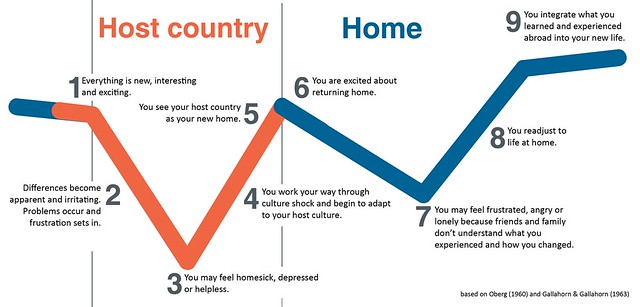
Traveling abroad can be one of the most exhilarating learning experiences of your life. Or it can turn out to be a series of bewildering and frustrating incidents that leave you longing for home. By thinking about and preparing for the process of cultural adjustment, you can enhance your study abroad experience.
What causes culture shock?
The difference between your expectations and what you actually experience is where you may begin to find problems in adjusting abroad. In spite of the fact that you may have already visited your host country, you will find it different to actually live there. It is easy to become frustrated by the differences in daily life. The easily-accessible facilities taken for granted in the U.S. may not always be available, and this can prove upsetting and stressful. Take this as an opportunity to find out one of the reasons why most students find study abroad so rewarding — it forces you to learn about your personal limits and strengths.
Stages of culture shock
- The "honeymoon" period — initial euphoria; you are fascinated with the new things you are experiencing.
- Irritability and hostility as you reject the foreign culture and people to focus on problems and differences — leads to culture shock.
- Learning to decipher foreign behavior and custom.
- Adaptation/biculturalism — acceptance and enjoyment of the foreign culture.
ADAPTING TO THE HOST CULTURE
- Maintain flexibility and be open-minded.
- Keep your sense of humor.
- Stay busy and set concrete goals. Resist withdrawing into yourself or surrounding yourself with other Americans.
- Be friendly and outgoing. Try to make a friend in the host culture.
- Instead of looking for an extended vacation, discover the satisfaction of immersing yourself in a different way of life. Be more than just a tourist.
- Remember that you are a visitor in this country. Do not expect special privileges.
- Get involved with aspects of the host culture that you can't easily do a home, such as participating in or observing a special ceremony or ritual.
- Respect the customs and opinions of the people you meet abroad.
- Engage in familiar sports and activities to keep from feeling overwhelmed by a completely foreign situation.
- Keep in touch with family and friends at home (but don't spend too much time online).
- Take care of yourself by getting enough sleep, exercising and eating healthy meals.
- Acknowledge that culture shock is normal and will pass. If these feelings increase in severity, seek help from your overseas contact person. If you are not receiving the help you need, contact your study abroad adviser right away.
Stereotypes
Study abroad includes dealing with your host culture's stereotypes about you, and also involves coming to grips with your own stereotypes about your host culture. Here are some common stereotypes about Americans:
- Outgoing and friendly
- Informal
- Loud, rude, boastful
- Immature
- Hard working
- Extravagant and wasteful
- Racially prejudiced
- Ignorant of other countries
- Wealthy
- Generous
- Promiscuous
- Always in a hurry
The following are some unflattering questions and generalizations about the U.S. that you may hear in another country. If these or similar questions are posed to you while abroad, try not to become defensive. Instead, try to address them by being patient, open-minded and gracious. Remember that you are abroad to learn about another culture, not to promote and become entrenched in your own. It is important to be mindful of current events in the United States to best address these questions in an informed way. Don't forget that you are acting as an ambassador of the United States and MU while you are abroad.
- We've heard so much about how easy your schools are. How can such a great nation have such a poor education system?
- Why do you put your old people in homes? Don't you care about the elderly?
- How can such a rich country have so many poor people?
- Why are Americans so ignorant of the world?
- How can you talk so much about human rights when you have racial problems in the U.S.?
- America is well-known to us from TV and films. With all the sex and drugs going on, you must be immoral.
- Why are you always trying to force your form of government on everyone else?
- Do you own a gun?
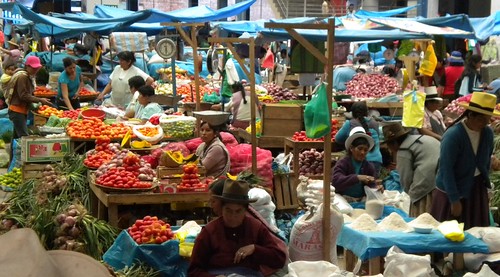 <
<
Discrimination
Some stereotypes can lead to active hostility against a group with a given identity. Some students may encounter active hostility toward Americans while they are abroad. This hostility can take many forms. Verbal insults are usually the most common and least dangerous. Students who find themselves in such situations need to escape the situation as quickly as possible. If a situation becomes openly hostile or dangerous, contact the local authorities or your on-site coordinator as appropriate.
Personal space
In every culture, there is a conception of what is considered appropriate personal space. Learn the etiquette of personal space in your host culture by doing your research before you go and observing other people once you are abroad. Don't be offended if someone invades your space by accident. Remember that in some cultures the American norm of wide personal space translates to aloofness and standoffish behavior. Your habits in regard to personal space could be telling other people something that isn't really true.
Polite behavior
Every culture has an idea of what is considered polite, what is informal and what is rude. These fine shades of social behavior take years to learn, even for natives; don't be discouraged if it takes you a while to adjust to these norms. Remember that some people, even in their own cultures, never quite get the hang of these distinctions. Some things Americans typically do that may be considered rude in other cultures include pointing, smiling at strangers, asking personal questions, teasing each other, shouting and calling people by their first names.
Topics of conversation
Many cultures have taboo subjects that may or may not make any sense to you. Try to find out what can be safely spoken about in polite conversation and what might be considered offensive or rude. Political discussions can become especially heated. If you are not sure where you stand on an issue or aren't willing to discuss it, simply back out of the conversation. The last thing most people want is to hear an ill-informed American talking loudly about an issue in local politics on which you have absolutely no idea.
Humor
Senses of humor differ drastically from culture to culture. What may be funny to you is not always going to be funny to an Australian, for example. Conversely, what an Australian considers hilarious, you may find rude and offensive. Be careful about what you joke about overseas and observe the joking behaviors of your friends. Learn from other people's mistakes. It's best to err on the side of caution when it comes to humor.
Food and eating
In some countries, it is impolite to keep your hands under the table and improper to put your knife and fork down to change hands after cutting a piece of food. Words used in the U.S. may mean something different abroad, and you may also encounter a few food surprises. For example, spaghetti in Italy is a first course, and French fries might be served with mayonnaise rather than ketchup.
Menus may state whether a tip or taxes are included in the bill. Check the customs of the country you are visiting, as tipping practices vary. Take time to explore local restaurants and eateries. You can learn a lot about countries by their cuisine and the clientele they serve. At the same time, be aware of food and water safety precautions. Also, watch out for extras. In some places, you may pay extra for a napkin or a glass of tap water. Food is available on most high speed trains, but may be more expensive. Plan ahead and bring something with you. In big cities, restaurants inside and around the train station are generally more expensive. Trekking a bit down a few side streets may lead you to something a little more special and in your price range. Travel guidebooks can often contain good information about restaurants.
It may be wise to bring any special dietary supplements or food items you are accustomed to, but keep in mind it is illegal to carry perishables or plants across country borders.
HEALTH ABROAD
You should follow basic health and wellness practices while abroad: eat balanced meals, get enough sleep, wash your hands often, exercise. If you become ill while abroad and need to see a health care provider, contact your on-site program coordinator or use the search on the GeoBlue Students website to find a provider nearby.
MENTAL HEALTH
Be sure to read the information in this handbook on culture shock. Be familiar with the symptoms of depression so you can identify problem signs and seek help if needed. Speaking another language all the time and adjusting to cultural differences can be tiring. Take care of yourself, and also learn how to recognize symptoms of distress or mental illness in your peers (e.g., engaging in risky behavior, personality changes like suddenly becoming more aggressive or more withdrawn, missed assignments, repeated absences from class, sleeping more or less than usual, lack of personal hygiene, excessive fatigue, constant sadness, expressions of hopelessness, focus on despair or death, giving away prized possessions). If you are in distress or see another student in distress, seek help immediately. Contact your on-site program coordinator, and you can also contact the International Center for additional support.
If you are experiencing mental health issues abroad, the following resources may be useful:
- MIUSA
- ULifeline: online assessment and answers to common health questions
- WebMD Mental Health Center
- Podcasts on dealing with anxiety and managing panic attacks
SEXUAL HEALTH
Although sex is not necessarily planned, safe sex should be, and you should always be prepared. Therefore, even if you are not planning to be intimate with anyone while abroad, you may want to bring appropriate protection, as what is available in America may be safer and more reliable than what you would find abroad. Do not be afraid of being perceived as promiscuous if you carry condoms or other sexual protection, and do not expect a partner to always have their own. It is important to take safe sex seriously.
In addition, remember that HIV and several STDs, including herpes and genital warts, can be transmitted during oral sex. A dental dam can significantly reduce the risk of coming in contact with a sexually transmitted disease.
ALCOHOL AND DRUGS
Attitudes toward alcohol and drug use vary considerably from culture to culture. Remember, you are subject to the laws of your host country; be sure to understand the laws surrounding drugs and alcohol. Although some countries have more liberal laws concerning drugs and alcohol, in many countries the laws and penalties are more severe. You are an ambassador of MU and the United States. You will be held to the MU Standards of Conduct Code, which you agreed to by signing the UM System Assumption of Risk and Release.
If you are of legal age to drink alcohol in your host country, do so responsibly. Serving sizes and alcohol content vary by country, which, when coupled with your new environment, may cause alcohol to affect you differently than you are used to. Be cautious and don't over indulge. Never let your beverage out of your sight — drugging drinks happens throughout the world.
Possession and use of illegal drugs will result in your immediate dismissal from your study abroad program. Drugs account for one-third of Americans arrested overseas, and penalties can be severe. Remember, never agree to carry a suitcase or package for someone else.
WATER AND FOOD PRECAUTIONS
In countries where the tap water is not safe to drink, do not drink the water, avoid ice cubes and use boiled or bottled water to brush your teeth. Review the food and water safety guidelines specific to your destination in your program- or country-specific handbook. In countries where the tap water is safe to drink, the slight difference in mineral content might be enough to upset your system. diet or environment affects your health adversely when you first arrive in a new country. If you do have a reaction to the local food or water, monitor your symptoms closely. It may just be your body adjusting, but if your symptoms become severe, seek medical attention.
BLOOD- AND FLUID-BORNE DISEASES
Given the potentially fatal consequences, blood- and fluid-borne diseases — such as HIV and hepatitis — warrant special attention. To be safe in dealing with blood or other bodily fluids, follow this rule of thumb: If it's wet and it's not yours, don't touch it.
TATTOOS AND BODY PIERCINGS
Before you decide to obtain a tattoo or piercing abroad, it is vital that you consider the potential health risks posed anytime a needle punctures your skin. The most serious risk is that of blood-borne diseases. If the equipment used to create your tattoo or piercing is contaminated with the blood of an infected person, you can contract a number of serious blood-borne diseases, including hepatitis C, hepatitis B, tetanus, tuberculosis and HIV. For more information, see the Mayo Clinic website.
OVER-THE-COUNTER MEDICATIONS AND FIRST-AID KIT
It's a good idea to take a small first-aid kit and over-the-counter medications that you use regularly. Products and availability differ by country. The MU Student Health Center recommends you consider taking these items (but check to be sure everything you pack is legal in your host country):
- Decongestant
- Benadryl for allergic reactions and motion sickness
- Topical antibiotic cream and bandages for cuts and scrapes
- Imodium or Pepto-Bismol for diarrhea
- Acetaminophen/ibuprofen for aches, pains and fever
SAFETY ABROAD
THE LAW ABROAD
While you are in another country, you are subject to its laws. Legal protections and rights that are taken for granted in the U.S. are left behind when you depart. American embassies and consulates are very limited in the assistance they can provide. They can provide the names of attorneys and doctors, but they can't provide financial assistance in paying for legal or medical services, nor can they intervene on your behalf in the administration of justice in the host country. Bail provisions as you know them in the U.S. are rare in other countries. Pretrial detention without bail is quite common in other countries. Prison conditions are often deplorable in comparison to conditions in the United States, and the principle of "innocent until proven guilty" is not necessarily a tenet of the legal system abroad.
It is your responsibility to become familiar with and obey the host country laws. At every MU and affiliated program site, there is a primary contact person who is responsible for MU students (e.g., resident director, host university contact person or faculty program director). This person should be your main resource in providing information about how host country laws may differ from U.S. laws. In addition, U.S. Department of State country-specific information can provide details about host country laws.
ARREST OR DETENTION OF A U.S. CITIZEN ABROAD
Nearly all countries where MU students study have signed the Vienna Convention on Consular Relations, which provides U.S. citizens who are arrested or detained abroad with the right to speak to a consular officer from the nearest U.S. embassy or consulate without delay. More than 170 countries are part of the VCCR. Many, but not all, of the 20 countries that are not part of the VCCR have some other bilateral agreement with the U.S. that addresses consular access.
Adhere to the following procedures if you are arrested or detained abroad:
- Do not make any statements to the country police prior to contacting a U.S. embassy or consulate (or your home embassy or consulate, if you are not a U.S. citizen) and do not make any statements without your lawyer present. Contact the nearest embassy or consulate immediately, tell them you have been arrested and request assistance. The embassy will almost always consider the arrest of a U.S. citizen abroad to be an emergency and will send a consular official within 24 hours. In addition, the U.S. embassy maintains a list of attorneys, but does not verify the quality of the professionals who ask to be included on the list. Contact your UnitedHealthcare Global insurance emergency number for additional legal assistance.
- Call your on-site contact person and the MU 24/7 emergency number as soon as possible. The International Center will work with MU campus experts to assist you to the greatest degree possible.
It is important to understand that neither the U.S. government nor MU can get you out of jail if you are arrested abroad. It is critical that you understand and obey the laws of your host country and any countries you plan to visit while you are abroad.
U.S. EMBASSY AND CONSULATE SERVICES
Should you encounter serious legal, political, health or economic problems, the nearest U.S. embassy or consulate can offer limited assistance. They can provide you with a list of local attorneys or physicians, contact next of kin in the event of an emergency or serious illness, contact friends or relatives on your behalf to request funds or guidance, provide assistance during civil unrest or natural disaster, and replace a lost or stolen passport. An embassy or consulate is the primary source for information on where to obtain advice; however, it cannot give advice directly.
EMERGENCY CONTACTS
MU International Center:
- During business hours: +1 573-882-6007 (8 a.m.–5 p.m. Monday–Friday)
- After hours: +1 573-882-7201 (MU Police will contact International Center staff)
Additionally, you should always carry the contact information for the following:
- On-site program coordinator/office
- Emergency phone number for host program/institution
- Nearest U.S. embassies/consulates to where you are studying or traveling
- Family members
- Local 911 equivalent
- Local recommended hospital
- Local recommended taxi service
STAYING SAFE
For your general well-being, it is advantageous to become familiar with your program site as quickly as possible. You should also familiarize yourself with cities you will be visiting before you begin to explore them. You should review the country-specific information for any country you will be visiting on the Department of State website. You may want to purchase travel guides before leaving the U.S.; they may be more expensive or unavailable in your host country.
Cities in other countries, just like American cities, have their safe and less safe neighborhoods. You can find out what areas to avoid by asking at an information booth in a train station or airport when you arrive, or by asking your on-site primary contact person. Use your common sense and do not take risks.
Be cautious when meeting new people. Don't give out your address and phone number to strangers or divulge too much personal information.
When withdrawing money from an ATM, go with a friend who will help you stay alert to your surroundings. Pick your ATM locations for safety, not just convenience.
Do not attract attention to yourself by speaking English loudly in public places or wearing expensive-looking jewelry. These mannerisms will likely attract thieves, or worse. If someone does try to rob or mug you, remember that your life is always more important than any of your possessions. Let them go and run away if necessary.
Taxis are not safe everywhere, especially late at night. In some places, women do not ride in taxis by themselves. Anyone can be robbed or assaulted by taxi drivers. In many cities, taxis have become so dangerous that people call for and identify reputable taxis. It is hard to resist the temptation of just flagging down a taxi on the street, but the wait is worth it. When you call a taxi, make sure to get the identification number or other information so you can be sure to get in the right one.
In general, do not frequent well-known American hangouts (e.g., restaurants, bars, clubs and associations, consulates and embassies). You should especially avoid these places if there is a terrorist threat, the U.S. has just participated in a military action or there is a warning about an impending terrorist threat. During times of international crisis, many U.S. embassies and consulates are picketed or threatened.
Do not hitchhike. Many people may tell you that it is perfectly safe — it is not. Do not be afraid to be assertive when confronted with unwanted situations. Do not let anyone push you into taking risks. If you feel unsafe, you probably are, so listen to your instincts.
Some factors that increase risk are being:
- Intoxicated
- Alone at night
- Alone in an isolated or high-crime area
- Asleep in an unlocked place
- Out after a local curfew
- New to the country
- Unable to speak the local language
- In a new place and making new friends
Political or social protests
When you digitally signed the Program Confirmation and Conditions of Participation, you agreed not to participate in any political activities while abroad. Even peaceful political or social protests can unexpectedly turn violent. Your participation in a demonstration is cause for dismissal from your program. You should also avoid aiding, abetting or associating with those involved in espionage or insurgencies.
Sexual harassment or misconduct and other forms of discrimination
The University of Missouri policies prohibiting discrimination on the basis of race, color, national origin, ancestry, religion, sex, sexual orientation, gender identity, gender expression, age, disability and veteran status are still in effect while you are abroad. This includes sexual harassment, sexual misconduct, intimate partner violence, stalking, sexual exploitation or invasion of sexual privacy. Information, support and resources related to these types of discrimination, including the online incident report form, are available through the Office for Civil Rights and Title IX. In the event of an emergency, call the University of Missouri 24/7 emergency assistance line through the MU Police Department at +1 573-882-7201 and ask to speak to an International Center staff member.
Swimming
Many drownings on beaches abroad are due to the fact that foreign swimmers are unaware of what the local population knows about undertows or particular dangers in that area. Do not count on lifeguards; there likely won't be any in most of the places you visit. Swimming in early morning, at night or under the influence of alcohol or other drugs increases your risk of drowning. In addition, in some countries, fresh water may be contaminated by parasites that carry diseases.
Fire safety
Fire safety codes differ from country to country. The U.S. has stricter first safety codes than what you may find in other countries. Take time to familiarize yourself with your new environment and know where the exits are. If you would like to have a fire safety kit sent to your international address, go to the Fire Safety Foundation website.
Driving and road safety
MU strongly recommends that you do not drive while abroad. Differences in local laws and driving behavior put you at high risk. Trauma resulting from traffic accidents is the number one cause of death for U.S. citizens abroad. For road safety information from 150 countries, go to the Association for Safe International Road Travel website.

Virtual kidnapping
Virtual kidnapping is the practice of extorting funds from unsuspecting family members without an actual abduction. Social media sites allow would-be extortionists to extract personal information about upcoming travel, as well as names and contact information of prospective victims. Virtual kidnappers often wait until a victim is in a location with limited or nonexistent cell phone communication. The virtual kidnapper then makes a phone call to a family member in the U.S., claiming to have abducted the student and demanding funds be transferred to a non-traceable account in exchange for the victim's safe return. Recently, there has been an increase in calls of this type made to the grandparents of students studying abroad. The requests are usually urgent and time sensitive; for example, claiming the student will be killed within an hour if payment is not made. Because the family often has no easy way to determine the truth of the claim, payment is usually made.
Avoid becoming a victim of virtual kidnapping:
- Do not share information about your upcoming trip online.
- Leave a detailed itinerary and contact information with your emergency contact.
- Maintain regular contact with family and friends back home.
- Do not share personal information with unknown callers.
- Establish a code word that could be used to verify kidnapping claims, like the name of your first pet.
- Never travel alone, particularly in areas where virtual kidnappings are becoming more prevalent.
If you or a family member receives this type of call, you should:
- Remain calm; remember that, in nearly all cases, this is a scam.
- Not share any personal or financial information with the caller; ask questions so that you can obtain as much information as possible.
- Never transfer any funds to the caller.
- Ask to speak to the alleged victim or for answers to proof-of-life questions that would require the caller to ask the alleged victim.
- Hang up as soon as possible.
- Immediately try to contact the alleged victim; if you cannot communicate with them, call the International Center.
MU STUDENT INTERNATIONAL TRAVEL POLICY
The U.S. Department of State issues a travel advisory for each country, as well as regions within countries, and assigns each a rating of level one to four based on risk indicators, including crime, terrorism, health concerns, civil unrest and natural disasters. To minimize health and safety risks, students planning to participate in study or university-related travel abroad programs in regions with a Department of State travel advisory level three (reconsider travel) or level four (do not travel) or a Centers for Disease Control and Prevention warning (level three) must request approval from MU's Student Travel Abroad Review Committee. Failure to do so could result in not having access to university support or resources in case of an emergency. Refer to the MU student international travel policy for more information.
IDENTITY ABROAD
The International Center believes all students should have the opportunity to study abroad because it can be one of the most profound ways to grow academically, professionally and personally during your time in college. The center's goal is to support you by providing resources that will empower you to take your different backgrounds, talents and experiences to a new community abroad; to bring new knowledge and skills gained abroad back to MU; and to become a successful global leader.
The University of Missouri policies prohibiting discrimination are still in effect while you are abroad. If you encounter an issue of discrimination related to your identity while abroad, contact the MU Office for Civil Rights and Title IX.
GENDER ABROAD
Gender-based social and cultural norms may be more strongly entrenched in your host country than you are used to in the United States. Some countries even have laws that enforce these norms, so it is important to research the cultural norms related to social interaction and dress. Women and feminine-presenting students may have additional matters to consider while abroad. It is important for all students to keep the following information in mind when traveling abroad.
The comparatively outgoing nature of Americans abroad can sometimes be misinterpreted as flirting or an invitation for company, rather than general friendliness. Research body language norms in your host country to avoid unintentionally giving off the wrong message. Many countries have gender-based dress codes, or a more conservative approach to clothing than you find in the United States. Following the dress norms of other countries may allow you to blend in a bit more and avoid unwanted attention.
Take cues from locals about body language, dress and interactions with individuals of other gender identities. Follow all of the advice in the staying safe section of this handbook, and women and feminine-presenting students in particular may need to take extra precautions. The same issues that women face in the U.S. may be more severe abroad. Conversely, you may find that gender norms are less of a concern for you in your host country than they are at home.
LGBTQ+ STUDENTS
Acceptance of LGBTQ+ individuals may vary by country. Some countries are more progressive than the U.S., while other countries have strict laws against being LGBTQ+. Speak with your study abroad adviser and do your own research on the following topics:
- Host country's cultural norms and laws related to the LGBTQ+ community
- Deciding how and when you will express your sexual orientation and the potential impact(s) of sharing or not
- Housing options and living with a host family
- Challenges of gender presentation and potential challenges when showing travel documents, such as passports
Resources for LGBTQ+ students
- MU LGBTQ Center
- NAFSA Rainbow special interest group
- International Lesbian, Gay, Bisexual, Trans and Intersex Association
- National Center for Transgender Equality
- Transportation Security Administration
STUDENTS OF COLOR
Students of color may have to navigate prevailing attitudes and stereotypes toward Americans, in addition to perceptions about racial and ethnic populations that exist in your host country. Your identity may be assumed to be different than what you claim because of preconceived notions of race and ethnicity in the United States. You may find it rewarding, however, to facilitate conversations about race and ethnicity with people in your host country. You may also encounter new ways of engaging in conversations about identity while abroad. Should a negative situation arise, you should reach out to your existing support networks. MU has resources that you will be able to access abroad. If you feel unsafe or if a situation escalates, contact your on-site coordinator for additional resources.
Resources for students of color
- MU Multicultural Center
- Gaines/Oldham Black Culture Center
- MU Division of Inclusion, Diversity and Equity
- Diversity Abroad
- The PLATO Project
STUDENTS WITH DISABILITIES
MU strives to provide accessible study abroad programs that meet your academic and personal needs. To enable your full participation in the study abroad experience, you may need some accommodations. It is important to be aware of the cultural differences about disability and accommodation in order to have a successful and safe experience abroad. The International Center will work with you and the MU Disability Center to help arrange for accommodations abroad and prepare you for your international experience.
Resources for students with disabilities
- MU Disability Center
- Mobility International USA
- University of Minnesota: Access Abroad
- Transitions Abroad
COMMUNICATION
IN-COUNTRY COMMUNICATION
While having a cell phone is not required by the International Center, some programs may require you to purchase a cell phone on-site, and many MU students decide to use or purchase cell phones abroad. If you are planning to take your cell phone with you abroad, contact your current provider to see what options are available. In addition, it may be possible to unlock your American phone, or you can rent or purchase a phone once you arrive in your host country. In most countries, if you unlock your phone or rent/purchase one abroad, you will need to buy a pre-paid SIM card that allows you to purchase minutes as you need them. Most offer free incoming calls and minutes can be purchased in varying increments. There are also a number of local messaging apps that may help you stay in contact with your friends or homestay family while abroad.
Be sure to check your MU email account regularly — this is the primary way the International Center and MU will communicate with you while you are abroad. If you are on an exchange or direct-enroll program, you should update your international contact information in your myStudyAbroad account.
COMMUNICATING WITH FRIENDS AND FAMILY IN THE U.S.
Technology is a great tool to keep in touch with friends and family in the U.S. while you are abroad. But be careful not to spend so much time communicating with loved ones back home that you miss out on great experiences in your host country.
Blogging
A blog is a great way to share your experience with a large number of people at once. It can also serve as a reflection tool and online journal for you to remember your experience when you return. Students on International Center-administered programs are encouraged to submit posts to the MU Study Abroad Blog. Selected posts will be entered to win monthly cash prizes.
Social media
Social media sites are an easy way to stay connected with your loved ones. Be careful not to spend too much time on social media, as it limits your opportunity to connect with your host culture and may increase homesickness. Remember that your study abroad experience is a time for you to learn about yourself and the world, so spend as much time as you can living and interacting with those around you.
Web and smartphone apps
Apps such as Google Hangouts, Skype and Facetime make it easy to video chat with friends and family in the U.S. for free, and can also be used to make voice calls over data or Wi-Fi connections (for free in some cases). You can also purchase minutes through Skype to make voice calls from a computer at a reasonable cost. Other apps such as WhatsApp and Viber are also popular choices among students.
Handbook, section 3 of 5: When you return

CHECKLIST
- Review the resources for returning students on the International Center website.
- Update your contact information in myZou.
- Participate in International Center activities for study abroad returnees.
- Submit your photos to the Study Abroad Photo Contest.
REVERSE CULTURE SHOCK
As you arrive back in the U.S., you are likely to experience reverse culture shock as you readjust to life back home. Just as your host country seemed difficult and unmanageable to you a little while ago, home may seem that way to you now. Reverse culture shock is a perfectly normal reaction suffered by many who have been abroad. It could range from annoyance at not finding the food and products to which you have become accustomed to difficultly re-establishing ties with family and friends. Initially, you may feel that you no longer fit in, but, in truth, your experience has given you heightened insight, appreciation and sensitivity.
EASING YOUR TRANSITION BACK TO THE U.S.
- Find a more receptive audience (like the International Center staff).
- Take advantage of opportunities to meet other study abroad alumni.
- Participate in study abroad recruitment events.
- Get involved with international organizations on campus.
- Request an international roommate if you live on campus, or try to form your own "language house" to keep up your language skills.
- Continue your foreign language studies.
- Stay in touch with people you met abroad.
- Subscribe to a newspaper or magazine from your host country.
Remember that return shock is temporary and you will be able to readjust to your home culture. Be patient, flexible and understanding of the events and people around you, and you will soon be reintegrated into the culture you have always known.
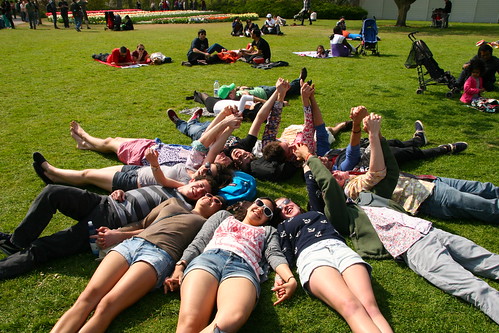
INDIVIDUAL CHARACTERISTICS ENHANCED BY LIVING IN OTHER CULTURES
- Awareness of international issues and needs
- Open mindedness
- Independence
- Tolerance of different viewpoints
- Competence in another language
- Sensitivity to differences in people and greater acceptance of diversity
- Complex self-awareness that will help when making decisions
- Creativity
- Appreciation of cultural relativity
PROGRAM EVALUATION
You may be asked to share your experiences by completing an evaluation upon returning home. Please take a moment to share your thoughts — both the good and the bad — so the International Center can better advise future study abroad students.
Handbook, section 4 of 5: Resources
GOVERNMENT WEBSITES
CULTURE AND TRAVEL WEBSITES
- What's up with culture?
- Lonely Planet
- Exchange rate information: Oanda, XE
- Electrical outlets abroad
- Student Universe
- STA Travel
- Worldwide hostel listings
- Hostelling International

